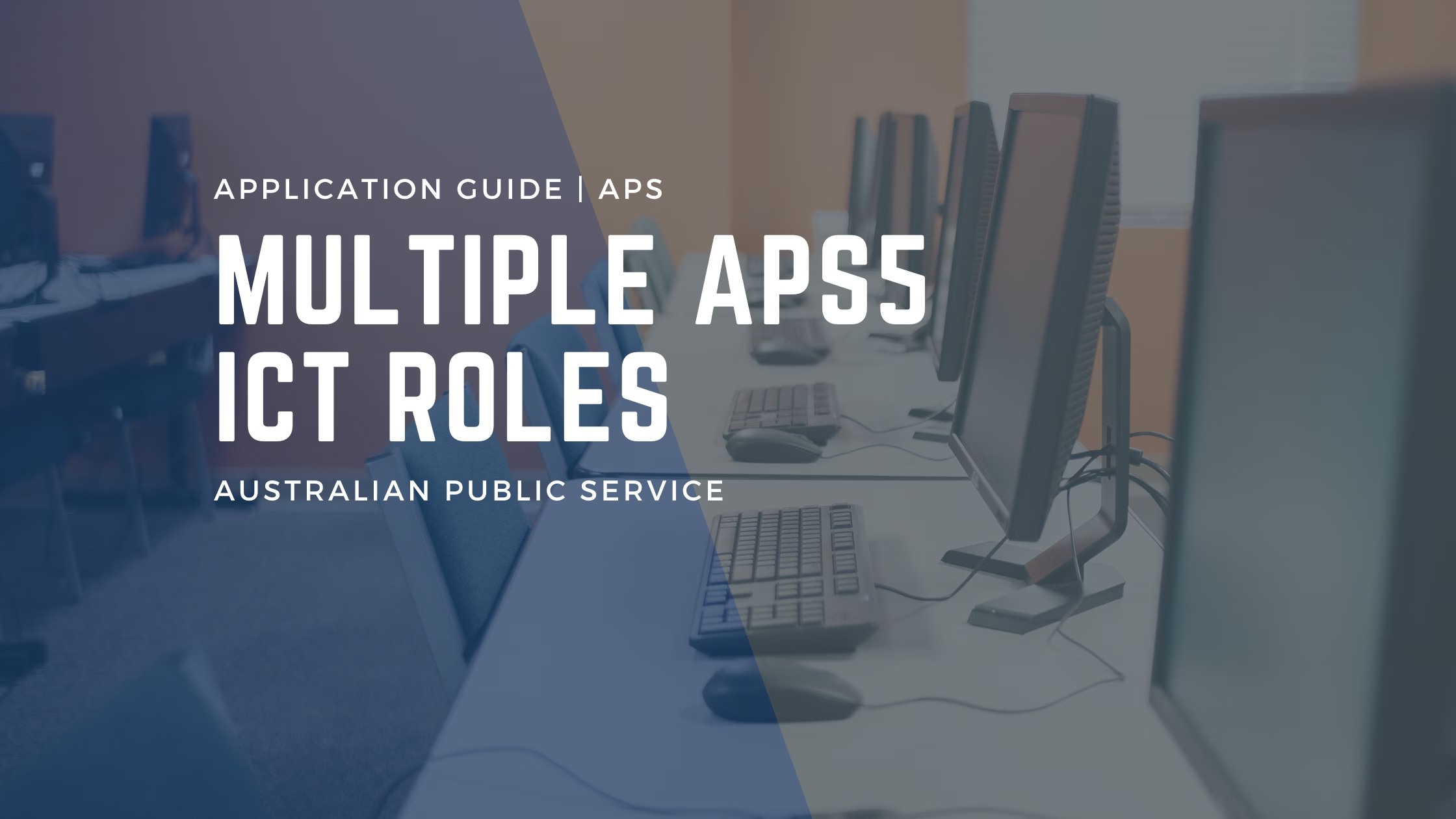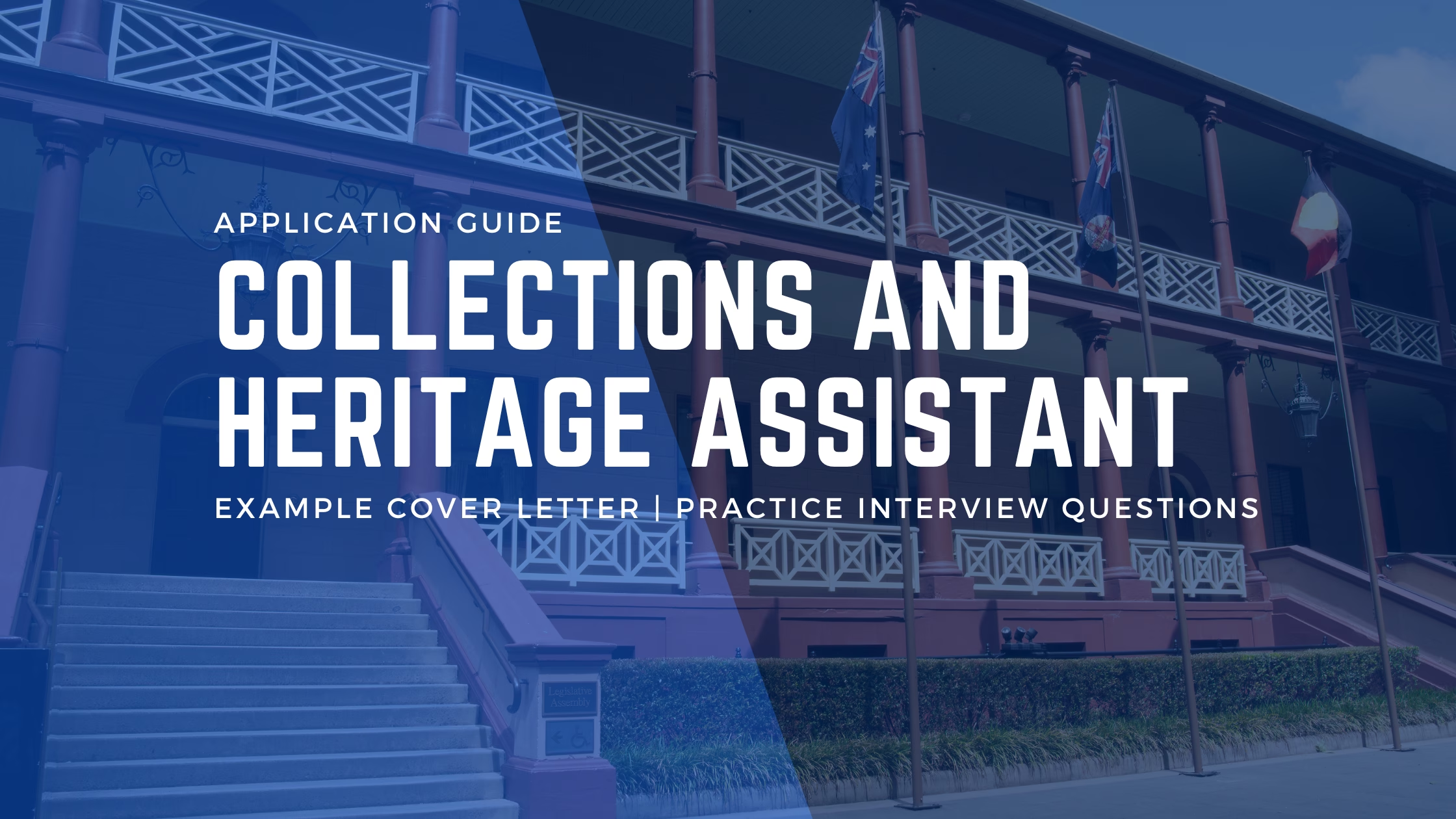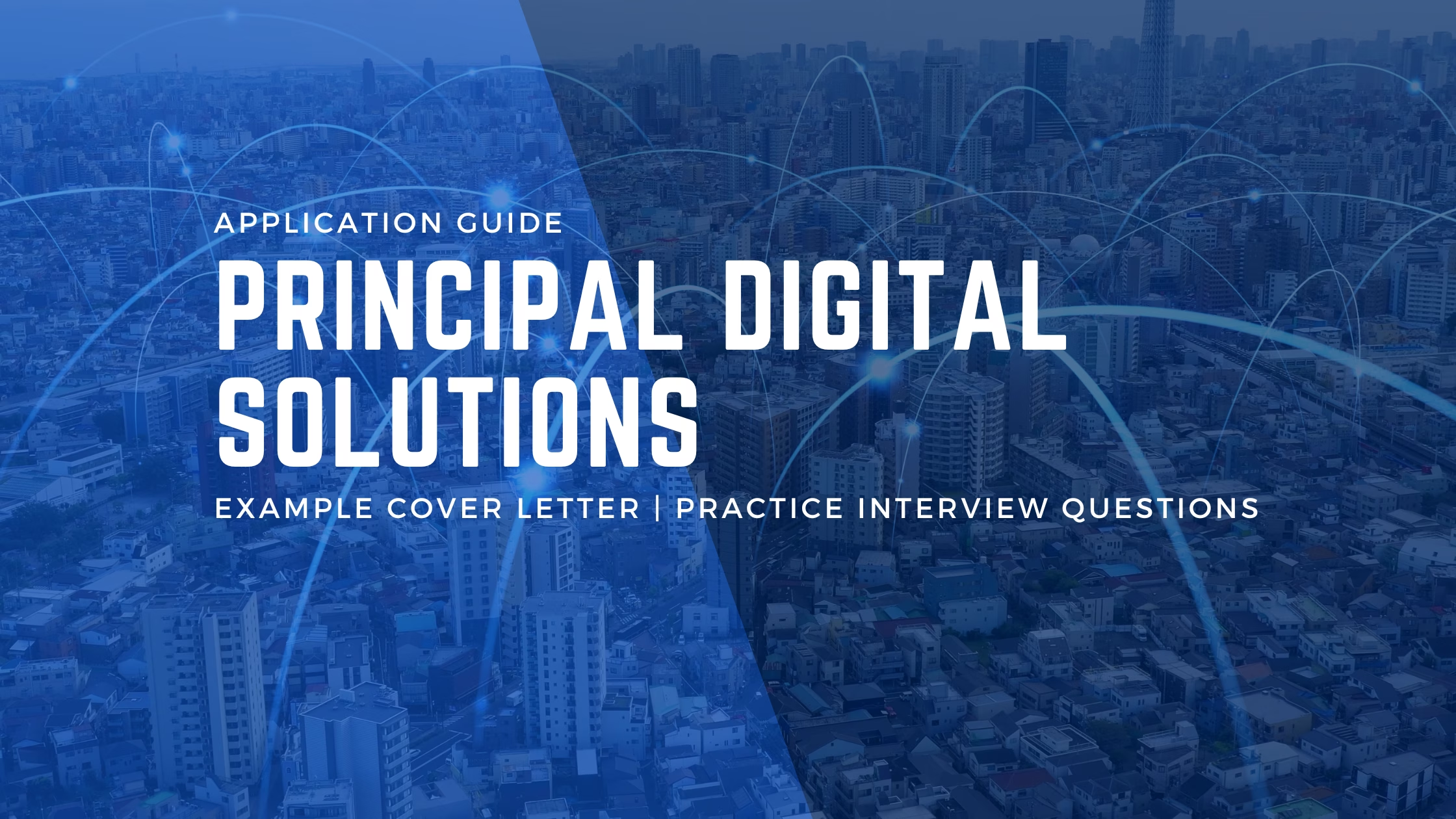Thinking about applying for an APS5 ICT job at the NDIA? You’ll find everything you need in this comprehensive guide—from salary and application tips, to an example APS pitch you can use right now.
These APS5 roles sit in the Agency ICT Services Branch, which supports National Disability Insurance Agency (NDIA) operations nationwide. Whether you’re experienced in cloud platforms, video conferencing tech, or service monitoring tools, this is a real opportunity to grow your federal government ICT career.
If you’re new to public sector recruitment, check out this unofficial guide to NSW Public Sector recruitment for more insider tips and context.
Table of Contents
APS5 ICT Jobs NDIA – Salary and Overview
| Position Title | APS5 ICT Officer – Multiple Roles (NDIA) |
|---|---|
| Organisation/Entity | National Disability Insurance Agency (NDIA) |
| Job Location | Nationwide (including Deakin, Midland, NSW) |
| Work Type | Ongoing (some non-ongoing opportunities available) |
| Base Pay | $86,624 – $93,253 + 15.4% super |
| Closing Date | 4 June 2025 at 11:30 PM AEST |
Multiple APS5 ICT Roles Available – Choose the One That Fits You
The NDIA is currently recruiting for multiple APS5 roles within the Agency ICT Services Branch, each offering a unique technical focus. These roles sit within the broader Chief Information Officer Division and support the delivery of high-quality ICT services across the agency. When applying, you’ll be asked to nominate your preferred position from the streams below.
Here’s a quick overview of each role and how they differ:
Service Reliability Analyst
Ideal for candidates who enjoy working with monitoring tools, automation, and system stability. This role focuses on enhancing the reliability and performance of ICT systems through proactive monitoring, automated escalations, and incident remediation. It suits applicants with strong analytical skills and experience in tools like Splunk or Dynatrace.
Site Technology Officer
This is a hands-on technical support role focused on physical ICT environments. It involves supporting audio-visual setups, installing and troubleshooting network hardware, and working directly with end users in NDIA offices across NSW. It’s well suited to someone with AV, networking, or desktop support experience—particularly if you’re confident working with tools and hardware onsite.
Platform Engineer
Best suited to those with a background in cloud infrastructure and systems administration. This role supports NDIA’s data platforms, both on-prem and in the cloud (AWS, Azure), ensuring they’re secure, scalable, and efficient. It’s ideal for someone comfortable working in a DevSecOps environment with a strong interest in data integration and performance optimisation.
Each role contributes to the delivery of ICT services in different ways, but all share a common goal: empowering NDIA staff to deliver better outcomes for participants. When preparing your application, focus your pitch on the role that aligns best with your skills, interests, and experience.
Challenges for APS5 ICT Officers
These roles span multiple specialties, each with unique demands. Service Reliability Analysts need to stay on top of real-time monitoring and automated remediation. Site Technology Officers must work hands-on with audio-visual gear and physical network setups. Platform Engineers maintain and deploy cloud solutions while supporting data teams.
You’ll often work with minimal supervision, making decisions that affect agency-wide infrastructure. This requires initiative, precision, and adaptability—especially if you’re working across offices or managing multiple stakeholders remotely.
Why APS5 ICT Roles at NDIA Are a Great Opportunity
This recruitment round is one of the largest ICT intakes currently open in the Australian Public Service, offering a rare and valuable opportunity for ICT professionals to step into federal government. With multiple APS5 positions available across three distinct streams, applicants can tailor their preference based on their technical background—whether that’s cloud infrastructure, service reliability, or hands-on desktop and AV support.
The NDIA is a high-impact agency with a strong commitment to inclusive service delivery. As part of its Agency ICT Services Branch, you’ll be directly supporting staff and systems that improve outcomes for people with disability. It’s meaningful work in a values-led organisation.
These roles are also ideal for those looking to grow. The NDIA fosters a learning culture grounded in modern DevSecOps practices, giving staff access to leading tools and continuous development opportunities. With positions available nationwide—including options for remote or flexible work—this is an accessible opportunity for applicants across Australia.
The benefits are significant: a permanent federal government role, generous leave entitlements, and 15.4% superannuation—well above the private sector standard. Combined with a welcoming, diverse, and collaborative workplace, these roles offer an exceptional pathway into public sector ICT.
Application Requirements for APS5 ICT Jobs NDIA
APS5 ICT Application Process
To apply, you will need to prepare and submit:
- Your current resume
- A pitch of up to 500 words
This pitch (also known as a statement of claims) replaces the traditional cover letter. It should explain:
- Why you want the role
- What you can contribute
- Examples of your relevant skills and achievements – linking directly to the requirements listed in the job ad.
What To Include In Your APS5 Pitch
When preparing your 500-word statement of claims (also known as your pitch), it’s important to clearly demonstrate how your experience aligns with the specific role you’re applying for. This is a very short pitch, so get straight into 3 or 4 STAR method examples that align with the requirements below.
Below is a summary of what should be addressed for each of the three APS5 ICT roles at the NDIA. You only need to respond to one role, so tailor your pitch accordingly and use specific examples wherever possible.
APS5 Service Reliability Analyst
Based in Deakin or Midland, this role supports the reliability and performance of NDIA’s ICT applications and infrastructure. You’ll be responsible for overseeing reliability issues, refining ICT monitoring (including security events), and developing automated alert and incident remediation processes. The focus is on maintaining seamless, secure, and stable services that support agency staff and partners.
Your pitch should demonstrate:
- Confidence in identifying trends, patterns, and anomalies within ICT systems
- Strong problem-solving skills, particularly in fast-paced, collaborative environments
- Clear and effective communication skills—both written and verbal
- Experience working directly with technical support areas to investigate and resolve reliability issues
- High attention to detail when monitoring ICT services and responding to alerts
- Familiarity or experience with monitoring tools such as Splunk and Dynatrace (desired but not essential)
APS5 Site Technology Officer
This NSW-based role sits in the Site Technology and Networks Section. It provides on-the-ground ICT support across NDIA office locations nationwide. You’ll liaise with technical staff, vendors and end users; support video conferencing and AV technologies; install and troubleshoot network hardware; and provide Microsoft 365 support. The role is hands-on and requires physical capability and technical problem-solving.
Your pitch should demonstrate:
- Experience managing video conferencing and audio-visual technologies, including configuration and acoustic testing
- Diagnostic skills in resolving issues with physical network services, including hardware installation, patching, and troubleshooting
- Capability to work with heavy and awkward equipment, such as visual displays
- Experience using tools like drills or similar for hardware installation and removal
- Proficiency in supporting and troubleshooting the Microsoft 365 platform
- Any relevant certifications in recognised ICT industry standards (e.g., CompTIA, Cisco)
APS5 Platform Engineer
This nationally available role focuses on maintaining and improving NDIA’s cloud and on-premises infrastructure. You’ll manage servers, networks, and storage systems, particularly those supporting data science platforms. Key responsibilities include implementing AWS and Azure cloud infrastructure, integrating systems with analytical applications, and monitoring performance to identify and resolve bottlenecks.
Your pitch should demonstrate:
- Subject matter expertise in the design, implementation, and compliance of cloud infrastructure (AWS and/or Azure)
- Ability to independently prioritise tasks and take ownership of assigned responsibilities
- Experience contributing to wider ICT teams or branch outcomes
- Strong collaboration skills across both technical and non-technical teams
- High aptitude for learning and adapting quickly in a fast-paced environment
- A clear passion for working within a DevSecOps environment using modern tools and technologies
Essential Role Requirements for APS5 Jobs at the NDIA
All applicants must be Australian citizens and be able to obtain a security clearance.
You will also need to complete an NDIS Worker Screening Check.
NIDA APS5 Application Checklist
| Task | Complete |
|---|---|
| Download free public sector cover letter template | ✅ |
| Review the requirements listed under “Enough about us, let’s talk about you” in the job ad | ✅ |
| Write 500-word pitch using STAR examples | ✅ |
| Get your pitch reviewed and your STAR examples improved. | ✅ |
APS5 Candidate Profile From Private Sector ICT
Harper has spent the last five years as an ICT Support Officer for a regional construction firm, where she was the sole onsite technician for a team of 80 staff across two offices. In this small business environment, Harper developed a hands-on, adaptable approach to technology support—handling everything from AV setup and M365 troubleshooting to physical cabling and hardware installation.
Her day-to-day work involves maintaining video conferencing systems for client meetings, configuring Microsoft Teams Rooms, resolving connectivity issues, and supporting staff with device rollouts. She’s confident using tools like drills and cable testers, and is used to balancing urgent requests with planned hardware maintenance. Harper holds a CompTIA A+ certification and recently completed a short course in network fundamentals.
Keen to move into a more structured, long-term role, Harper sees the APS5 Site Technology Officer position as an ideal opportunity to transition into government. She’s excited by the chance to support NDIA offices across NSW and contribute to an organisation delivering vital services. With strong diagnostic skills, a service-focused mindset, and a proven ability to work independently, she’s ready to bring her private sector experience into the public sphere.
Example 500 Word APS5 Pitch – ICT NDIA
I am excited to apply for the APS5 Site Technology Officer position with the NDIA. With five years of experience as the primary ICT support officer in a regional construction firm, I bring hands-on technical knowledge, diagnostic capability, and a strong service mindset developed through supporting diverse end users across multiple locations.
In my current role, I take full ownership of maintaining and improving our meeting room technologies. One of my key responsibilities is the management of video conferencing and audio-visual technologies, including configuration and acoustic testing. For example, when we transitioned to hybrid work during the pandemic, I led the setup of Microsoft Teams Rooms across our two offices. I configured AV hardware, performed acoustic testing to minimise echo and feedback, and created user guides to help staff navigate the systems confidently. The result was a 75% drop in AV-related support requests and improved engagement in remote meetings with clients and senior executives.
My role also demands strong diagnostic skills in resolving issues with physical network services, including hardware installation, patching, and troubleshooting. Recently, I was tasked with addressing frequent disconnections across our open-plan workspace. I performed a full assessment of patch panel connections and identified two misconfigured switches causing network instability. After reconfiguring the setup and testing throughput, I saw a significant reduction in network complaints. I also implemented a basic documentation system for future hardware changes, improving transparency and reducing troubleshooting time for new staff.
In this small business environment, I am frequently required to perform physical installations and reactive repairs with minimal notice. I have extensive experience in handling heavy and awkward equipment, such as visual displays, including mounting 75-inch monitors in meeting rooms and training spaces. I’m equally comfortable using tools like drills and cable testers to install wall brackets, route cables, or secure hardware in high-traffic areas. In each instance, I work to ensure minimal disruption to staff while maintaining a high safety standard and a tidy finish.
A core part of my current role involves the support and troubleshooting of the Microsoft 365 platform. I assist staff daily with issues ranging from Outlook sync errors to OneDrive access, Teams meetings, and SharePoint permissions. I’ve introduced local troubleshooting flowcharts and a simple guide to using M365 more effectively, which has empowered users and reduced repeat requests. My ability to explain technical concepts in plain English has built trust and enabled smoother collaboration between technical and non-technical colleagues.
In support of my practical experience, I hold a CompTIA A+ certification, and I recently completed a short course in networking fundamentals to deepen my understanding of LAN/WAN environments. I’m also undertaking self-paced study toward a Microsoft 365 Certified: Modern Desktop Administrator Associate credential to strengthen my M365 administration capability.
I am motivated to join the NDIA because I want to contribute my skills to a values-driven agency supporting Australians with disability. I’m ready to bring my private sector experience into a government role where I can grow professionally and make a meaningful impact through reliable, inclusive technology support.
Writing your pitch? Send through your draft—I’ll help make sure it clearly showcases your skills and experience.
How to Use the STAR Method in an APS5 Pitch
When applying for an APS5 role, your 500-word pitch should go beyond simply listing responsibilities—it needs to demonstrate your skills through real examples. The best way to do this is by using the STAR method, which stands for Situation, Task, Action, and Result.
Each STAR response gives the panel insight into not just what you’ve done, but how you approached it, what decisions you made, and what impact you had. While your pitch shouldn’t label each part explicitly, you should structure your paragraphs to tell a concise, outcome-focused story.
Here’s how Harper used the STAR method in her pitch for the APS5 Site Technology Officer role:
“Recently, I was tasked with addressing frequent disconnections across our open-plan workspace. I performed a full assessment of patch panel connections and identified two misconfigured switches causing network instability. After reconfiguring the setup and testing throughput, I saw a significant reduction in network complaints. I also implemented a basic documentation system for future hardware changes, improving transparency and reducing troubleshooting time for new staff.”
Let’s break it down:
- Situation: Frequent network disconnections across the workspace.
- Task: Investigate and resolve the root cause.
- Action: Assessed patch panels, identified switch misconfiguration, reconfigured systems, and created documentation.
- Result: Resolved the issue and improved efficiency through reduced support requests and clearer processes.
When writing your pitch, aim to include two to three STAR examples like this—each focused on a skill or capability listed in the role description. Choose scenarios that show your initiative, technical skill, and how you’ve contributed to outcomes. Keep the narrative focused, avoid jargon, and let the results speak for themselves.
How to Prepare for an APS5 ICT Interview
EXCLUSIVE DISCOUNT: If you’ve read this far, I know you’re serious about applying. So enter the code “APS100” and get $50 off a government interview practice session.
Interviews for APS5 roles in the Australian Public Service—like those at the NDIA—are highly structured and capability-based. Rather than informal conversations, these interviews assess your ability to meet specific behavioural and technical requirements using real examples. Being well-prepared can make all the difference.
Here’s how to get ready:
- Review the APS5 Work Level Standards and focus on behavioural indicators relevant to your stream (e.g. technology support, problem-solving, stakeholder engagement).
- Brainstorm two to three STAR examples from your recent experience that align with the responsibilities of the role. If you’re applying for the Site Technology Officer position, make sure your examples reflect hands-on support, M365 troubleshooting, or network hardware work.
- Match each example to the NDIA’s expectations around initiative, communication, accountability, and service delivery.
- Practise your responses aloud, ideally in conditions that simulate the real interview. If you’re allowed to use notes during the interview, prepare a set of concise cue cards to keep your examples sharp and focused.
One strong STAR response might look like this:
“When our regional office experienced recurring AV issues during client meetings, I led the reconfiguration of the Microsoft Teams Room setup. I tested for acoustic interference, adjusted the equipment layout, and trained staff on the new system. As a result, AV complaints dropped by 75% and meeting engagement improved noticeably.”
Example interview questions you may be asked include:
- Tell us about a time you resolved a technical fault with AV or network infrastructure.
- How do you balance urgent support requests with planned ICT maintenance?
- Can you describe your experience with Microsoft 365 and how you’ve supported users?
Don’t leave it to chance—book a mock interview to practise.
The best way to build confidence and refine your responses is through a structured government mock interview session. These sessions simulate the real APS interview environment and provide you with tailored feedback on your delivery, STAR structure, and alignment to APS5 expectations.
✅ You can book a 1-on-1 Government Practice Interview Session here. It’s the fastest way to go from nervous to ready.
If you’ve already invested time in writing a great pitch, a practice interview is the next step to make sure you can speak to your experience just as strongly.
Get Your APS5 Application Started Now
Click here to start your online application now.
The process takes time—so it’s important to begin early to avoid a last-minute rush.
As you work through the form, start drafting your strongest STAR examples. These should highlight your achievements and align directly with the responsibilities and requirements of the specific role you’re applying for.
Once you’ve got a draft of your 500-word pitch, send it through. I’ll review it against the role and provide detailed feedback to make sure it’s competitive.
If I can’t improve it, I’ll refund your money—no questions asked.




